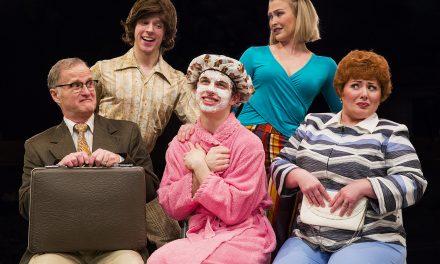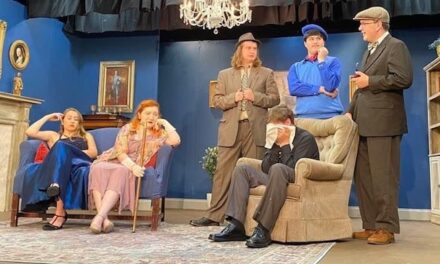Kristy Calman, Diane Stretz-Thurmond, Alice Ryan Chiles, Kim Butterweck, Kate Scinta, & Michelle Chalmers in Calendar Girls. Photo courtesy of Eve Theatre Company.
Calendar Girls
By Tim Firth, based on the screenplay by Juliette Towhidi & Tim Firth
Directed by Kate Larken
Review by Keith Waits
Entire contents copyright © 2016 by Keith Waits. All rights reserved.
The movie Calendar Girls, which came out in 2003, was one of the later entries in the trend of what was in America called ‘twee’ British film comedies; quaint and often heartwarming stories taking place in rural communities. Starring Helen Mirren, Julie Walters, and Penelope Wilton, it was the true story of a group of Yorkshire women, members of the Knapely chapter of the Women’s Institute, a staid, traditional, network of community groups devoted to floral arranging, baking, and crafts. The Knapely ladies, Chris (Diane Stretz-Thurmond), Annie (Kate Scinta), Cora, Kristy Calman), Jessie (Alice Chiles), Celia (Michelle Chalmers), and Ruth (Kim Butterweck) are restless and gently defiant of their leader, Marie (Cindy Smith) and her roster of lecturers on such stirring topics as broccoli.
Annie’s husband, John (David X. Thurmond), is fighting cancer, and the first half of act one is dominated by his deterioration and eventual demise. The tone of the play shifts with care from cheeky humor to grief and sorrow. When Chris dreams up the idea of the members posing in the nude for a fundraising calendar to honor John, there is a transition to a broader sense of humor, which remains until the unexpected success of the calendar leads to conflict.
The story speaks to ideas of female empowerment and relationships within community, themes that were communicated with greater subtlety in the film. A more casual pace, a stronger sense of place through location shooting in Yorkshire, and much more character development, all contributed to the gentle, colloquial appeal of the story onscreen. The play, adapted by Tim Firth from the original screenplay he co-authored with Juliette Towhidi, is a more economical rendering that sacrifices the finer nuances of the movie in favor of a sketchier narrative that skims along the high points like a stone skipping across the water.
Of course, if one has never seen the movie, none of that comparison may matter, and Calendar Girls onstage offers a breezy, more superficial approach that makes for an entertaining evening of theatre that might cause you to get out your handkerchiefs.
The performances are generally good, and the ensemble does very well with the comedy, and a fair job with the pathos. David X. Thurmond’s low key but effortlessly charming work as the doomed John is key in that regard, as is Kate Scinta’s similar efforts as Annie. Kristy Calman and Alice Chiles both displayed an easy authority with a punchline. The story is English, and there were varying degrees of success with dialects, with at least one that sounded more Scottish than Yorkshire, and a few that came and went with no foothold in reality, and this randomness illustrates that consistency with accents can be difficult without a dedicated dialect coach. The only other men onstage, Sean Childress as Rod, Chris’ husband, and Miguel Walker as Lawrence, the photographer, do well enough in this department.
The setting was functional, if not inspired, and the costumes were fine. The sequence of the photo shoot, a small masterpiece of comedy construction in the film, is also here the comic high point of the play, and staged with extreme discretion and good taste, but without the more delicate notes of vulnerability and the gentle humor of the contrast against the husbands waiting in a pub that gave important expansiveness to the moment. It is the centerpiece of the action, and for the stage, Firth’s script positions it as a bawdy, farcical romp that earns big laughs rather than the immeasurably more insightful take we find in the film.
It may not seem fair, but it is difficult for this reviewer to separate the one from the other, and I cannot help but wish that the playwright had endeavored to hold onto so much of what is missing, and I wonder if this text was specifically designed for local companies with limited budgets in mind. Calendar Girls is a meaningful exploration of women finding their collective voice, changing the social order a little bit, and moving their community forward so that its philanthropy and humanism is a better match for their time. How the men in their lives reacted and supported these choices is also an important aspect that is given short shrift onstage, where the men are largely relegated to the sidelines. However much fun this production is, and it is highly enjoyable, it also highlights the missed opportunity of the translation from screen to stage.
Calendar Girls
June 16 -25, 2016
Eve Theatre Company
At Kentucky Country Day Theatre
4100 Spingdale Road
Louisville, Kentucky 40241
Evetheatrecompany.com
Keith Waits is a native of Louisville who works at Louisville Visual Art during the days, including being the host of PUBLIC on ARTxFM/WXOX-LP, but spends most of his evenings indulging his taste for theatre, music and visual arts. His work has appeared in Pure Uncut Candy, TheatreLouisville, and Louisville Mojo. He is now Managing Editor for Arts-Louisville.com.





